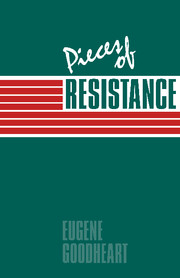Book contents
- Frontmatter
- Contents
- Preface
- Acknowledgments
- Autobiographical
- Part I Critics and criticism
- Part II Contemporary culture in conflict
- Part III Writing in America and elsewhere
- 13 The New Country: Stories from the Yiddish About Life in America
- 14 Three Novels, by Daniel Fuchs
- 15 The demonic charm of Bashevis Singer
- 16 The thirties revisited: Meyer Liben's Justice Hunger and Nine Stories
- 17 Bernard Malamud's A New Life
- 18 Ralph Ellison's Shadow and Act
- 19 William Styron's The Confessions of Nat Turner
- 20 Donald Barthelme's The Dead Father
- 21 Raymond Carver's Cathedral
- 22 Saul Bellow's Him with His Foot in His Mouth and Other Stories
- 23 The claustral world of Nadine Gordimer
17 - Bernard Malamud's A New Life
Published online by Cambridge University Press: 05 August 2012
- Frontmatter
- Contents
- Preface
- Acknowledgments
- Autobiographical
- Part I Critics and criticism
- Part II Contemporary culture in conflict
- Part III Writing in America and elsewhere
- 13 The New Country: Stories from the Yiddish About Life in America
- 14 Three Novels, by Daniel Fuchs
- 15 The demonic charm of Bashevis Singer
- 16 The thirties revisited: Meyer Liben's Justice Hunger and Nine Stories
- 17 Bernard Malamud's A New Life
- 18 Ralph Ellison's Shadow and Act
- 19 William Styron's The Confessions of Nat Turner
- 20 Donald Barthelme's The Dead Father
- 21 Raymond Carver's Cathedral
- 22 Saul Bellow's Him with His Foot in His Mouth and Other Stories
- 23 The claustral world of Nadine Gordimer
Summary
In a recent issue of Commentary, Philip Roth delivers a long complaint against “the American reality” from the point of view of the writer. “The American writer in the middle of the 20th century has his hands full in trying to understand, and then describe, and then make credible much of the American reality.” Roth is understandably appalled by the extravagance of a culture that has produced Charles Van Doren, Roy Cohn, David Shine, Sherman Adams, Bernard Goldfine and Dwight David Eisenhower. He speaks ironically of the American reality as “a kind of embarrassment to one's own meager imagination,” and what he means, I suppose, is that the writer cannot expect from his world a center or poise that will make it possible for him to see his world whole. The point Roth is making has been made in a somewhat different form by Mary McCarthy in an article in which she examines the failure of the modern novelist to contain a whole society in his imagination. The achievement of a Balzac or a Tolstoy no longer seems possible. The self-enclosed discreteness of modern experiences has broken the chain of being which enabled the nineteenth century novelist to see the whole world (or nation) in the individual destiny. So that no contemporary writer seems able to produce, for instance, the resonance of the Tolstoy an sentence: “The previous history of Ivan Ilych was the simplest, the most ordinary and therefore the most terrible.”
- Type
- Chapter
- Information
- Pieces of Resistance , pp. 143 - 147Publisher: Cambridge University PressPrint publication year: 1987



